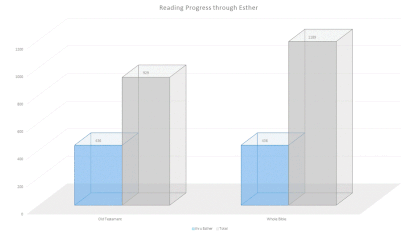Week Nineteen Reading Assignment:
Nehemiah 2 - Job 1
“The Bible isn’t all easy to understand. Picking bits at random can be dangerous. Only serious, reverent study secures its treasures. This takes time -- and we have crowded our lives with other things. So let us resolve to know this book better, to learn to live in it, to give time to it daily, to wait on the Holy Spirit before we turn a page, to let God apply it to our soul.”
(William Sangster)
(William Sangster)
This Week's Teaching Video: Late Old Testament Geography
Charting Our Progress
Character Profile:
|
The Good Book Review:
|
The Good Book Review:
|
